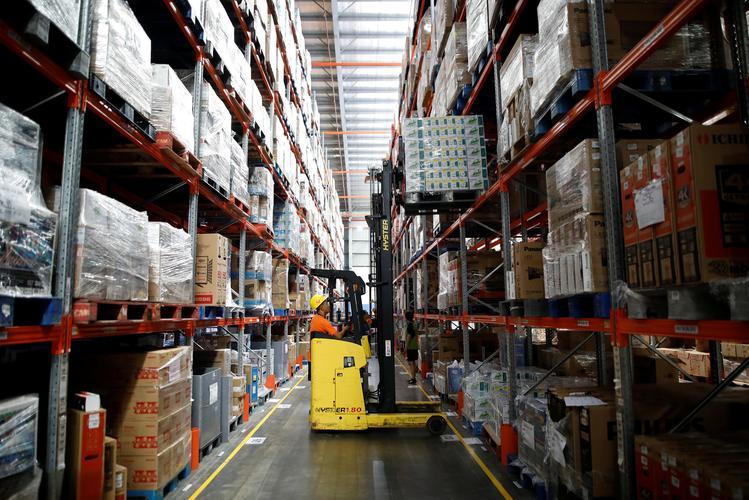How to buy from China
HandHunt
What is Buying from China?
Buying from China refers to the act of purchasing products or goods that are manufactured or sold in China. The Chinese government has implemented numerous policies to support export trade. This includes a wide variety of items, from a sheet of paper to machinery; you can find anything you need.

Why is Buying from China Important?
China is rich in resources. Compared to other countries, Chinese suppliers can offer you better logistics services. Known for its large-scale manufacturing capabilities, China can provide high-quality products while its low labor costs help reduce production expenses. Additionally, Chinese suppliers offer a diverse range of products to meet all your needs, from a sheet of paper to machinery.
Step-by-Step Guide to Buying from China
When purchasing goods from China, you need to know the steps to take and when to take them. You'll need to put in the effort to find reliable suppliers, fully understand the manufacturing process, and grasp the details of shipping logistics, customs clearance, and delivery. To simplify this process, you can use HandHunt, which makes it easy to purchase the products you want and have them shipped directly to you.
- Identify Your Import Products
Have a clear idea of the products you want to import. Any details you can think of will help you reach your goal. Research your product thoroughly before placing an order with suppliers. This will give you more leverage to optimize your product during negotiations with suppliers and manufacturers. - Understand Chinese Import Rules and Regulations
Knowing the import rules will help you communicate effectively with Chinese suppliers. If you lack knowledge in this area, consider learning online. Understanding these regulations will save you both time and money. - Obtain Import Licenses
For common products from China, an import license is usually not required. However, if you plan to import alcohol, copyrighted materials, tobacco, animals, firearms, food, etc., you will need an import license. These items are regulated by specific agencies. An import license will legitimize your business in China. - Use Efficient Communication Tools (WeChat Recommended)
WeChat is a popular communication tool in China. If you have the opportunity to connect with potential suppliers, use WeChat for negotiations. It is practical and efficient. - Demonstrate International Trade Experience
Your experience will earn the trust of suppliers. Reliable suppliers will also evaluate you. Professional terminology and strong negotiation skills are marks of good international trade experience. - Express Your Needs in Simple and Specific Terms in Emails
Be concise when communicating your needs to potential suppliers. Experienced suppliers can gauge whether you are a suitable business partner from your message. They receive numerous emails daily, and clear, concise communication will help you find a good supplier. - Respond Quickly
Professional international trade suppliers typically respond within 24-48 hours. They do not want to miss any potential business opportunities. - Check for Good Reputation and Export Licenses
Good reputation comes from long-term clients. Visit suppliers' official websites to investigate their reputation, growth, services, and qualifications, especially their export licenses. Legal business depends on export licenses. - Advanced Technology and Equipment
Communicate with suppliers to see if they have advanced technology and equipment. This ensures high-quality products and the ability to produce large quantities quickly, leading to greater profits. - Stable Raw Material Procurement
Reliable suppliers must have stable long-term raw material procurement. They should provide accurate feedback from their source partner database. Stable raw material procurement ensures you can meet bulk production demands, leading to stable customer relationships, reputation, and profits.
You can review suppliers yourself, but this requires time and patience. Always request samples and be wary if a supplier is unwilling or unable to answer your questions. If a supplier does not meet your standards, don't hesitate to start the search process over.
2. Producing the Products
Once you have found your supplier, you need to focus on product manufacturing. Your supplier must clearly understand your product requirements, and your business should be ready for some level of quality control.
- Clarify Total Costs
Remember, total costs include not only the prices listed on the order but also taxes, tariffs, shipping fees, and insurance. - Request FOB Quotes and Catalogs
FOB quotes and catalogs will help you understand the pricing structure clearly. - Ask for Discounts
It’s always best to ask suppliers for discounts. Every penny saved increases your profit. - Communicate Your Product Requirements and Ideas
Share your product ideas with your supplier. They can help design the product to meet your needs. Customized products are more popular with customers. - Request Samples and Test Reports
Before placing a large order, request product samples. You should also ask for test reports. Samples allow you to check product quality, and test reports will ease your business operations in your home country. - Clarify Minimum Order Quantity (MOQ)
When working with a supplier for the first time, it’s better not to place a large order. Discuss the MOQ with the supplier. If you show genuine interest, they are likely to accommodate your MOQ requirements. - Confirm Packaging and Labeling
Confirm the details of packaging and labeling, including materials, dimensions, weight, markings, and costs. Proper packaging and labeling ensure the quality and safety of your products while reducing cost waste.
If you cannot visit the factory in person, request regular photos and videos of the production process from your supplier. They should show you the finished products, whether they are palletized and properly stored, and evidence that they are following your manufacturing instructions.
3. Shipping, Customs Clearance, and Delivery
Even after producing high-quality products, you need an economical way to import them. This involves detailed logistics planning from the factory and any temporary storage to the port, tracking the goods during transit, and ensuring you have the proper documents and paperwork for customs clearance.
- Determine the Total Cost
When confirming each product detail, you should determine the total cost. The final price includes the unit price, packaging cost, labeling cost, and taxes. Only after confirming the total cost should you place a purchase order with the supplier. - Provide Your Purchase Order
A complete purchase order includes all confirmed details of the order. You can request a paper or electronic document from the supplier that lists the quantity, category, price, packaging, shipping items, deadlines, and other specifications of the products. - Sign a Purchase Contract
It is essential to sign a purchase contract when placing an order. A clear contract will outline all aspects of the imported items, including orders, shipments, payments, international trade terms, and more. A comprehensive purchase contract ensures the safety of your products and property in China. - Specify the Delivery Location
The delivery location affects the arrival time and cost of your imported goods. Negotiate the delivery address with the supplier. Delivery types include FCA (Free Carrier), FAS (Free Alongside Ship), FOB (Free on Board), or DAF (Delivered at Frontier). - Ensure Product Safety
Product safety encompasses the integrity and usability of the product. The higher the product safety, the fewer after-sales issues you'll encounter, leading to higher profits. - Agree on Delivery Deadlines with the Supplier
Delivery deadlines are crucial and should be confirmed with your supplier. If you receive the goods before the deadline, it will increase your trust in the supplier. - Choose the Right Shipping Method from China
Common shipping methods from China include air freight, sea freight, rail transport, and door-to-door delivery. - Define Pricing Terms
When importing products from China, you must pay VAT and import taxes before the goods are allowed into your country. This depends on the product classification. - Confirm Payment
Payment methods are important. Chinese suppliers typically accept credit cards, cash, checks, and PayPal. Most Chinese suppliers prefer credit cards. PayPal is a better payment method whether you're paying online, on mobile devices, in apps, or in person. Remember, you only need to pay a deposit before receiving the imported goods. If asked to pay in full before shipment, consider the business safety carefully. - Request an Invoice
After making the full payment, you can request an invoice. Your customers may ask for invoices when you sell imported goods in your country. Therefore, you should calculate the tax points. The invoice from your Chinese supplier will help you save money.
Common Mistakes When Buying from China
Not Understanding Cultural Differences (Communication)
Language and cultural barriers pose a challenge for businesses new to sourcing from China. Miscommunication can make negotiations difficult and lead to issues with product specifications or customization. HandHunt has bilingual experts to ensure accurate negotiations and clear communication of product requirements.
Choosing Products Based on the Lowest Price
There is often a temptation to find factories offering the lowest prices, but this can be a significant mistake. Cheap manufacturers usually lack professionalism and have longer delivery times. They might also be located in areas with high shipping costs, negating any savings and providing no real benefit. HandHunt can help you negotiate the best prices for your business without sacrificing professionalism or high-quality end products.
Placing Orders Before Receiving Samples
Even with a reliable manufacturer, it’s a costly mistake to start mass production without first seeing samples. Your product might have design flaws or issues, and your manufacturer could make errors following your specifications. The sampling process validates your design and ensures the factory understands your requirements. HandHunt knows how to expedite the sampling process, ensuring the factory is ready for mass production without unnecessary delays due to communication issues or sample shipping delays.
Using a Sourcing Agent Like HandHunt for Direct Purchasing from China
A sourcing agent in China is a great solution for addressing import challenges. If you lack import experience, it’s best to hire a Chinese sourcing agent. They provide efficient service, high-quality procurement, reliable suppliers, low-cost manufacturing, and secure shipping. Paying a sourcing agent for satisfactory service is a wise investment.
- Ensuring Business Safety in China
The biggest benefit of using a sourcing agent is they ensure your business safety in China. They guarantee the safety of every step before your products are shipped to your country. Security in products, shipping, and payments eliminates wasted time and reduces costs from communication misunderstandings. - Helping Define Your Products and Suppliers
If you’re unsure about your products, a sourcing agent can assist. They help customize your products and check the quantity and quality. They connect you with experienced suppliers at the lowest cost, allowing you to focus more on sales.
- Recommending a Sourcing Agent
HandHunt
HandHunt’s goal is to make procurement more profitable. They provide a dedicated team to help you find reliable suppliers and high-quality products. With legal and specific contacts, HandHunt simplifies your import process. As a result, you get the best-priced products, timely deliveries, and increased business profits.
